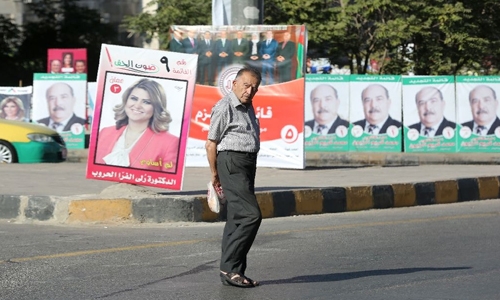Jordan votes in election tipped to see Islamist return
Amman: Jordanians voted Tuesday in an election that could see opposition Islamists re-emerge as a major parliamentary force in the key Western ally. The focus will be on turnout and the performance of the Islamic Action Front, the political arm of Jordan's Muslim Brotherhood. Experts expect the party to clinch around 20 seats in the 130-seat parliament, which would make it the largest opposition force. The vote comes as Jordan wrestles with the spillover of wars in neighbouring Syria and Iraq and the burden of hosting hundreds of thousands of refugees. The kingdom is a member of the US-led coalition battling jihadists in both neighbouring countries and was the target of a June 21 suicide bombing claimed by the Islamic State group that killed seven border guards.
The interior ministry said 50,000 policemen have been mobilised to ensure security at polling stations. The Phenix Center, a local pollster, has said 42 percent of eligible voters planned not to take part in the election, reflecting a general lack of enthusiasm for a parliament with limited powers to affect government policy. In Jordan, King Abdullah II can appoint and sack military and intelligence chiefs, senior judges and members of parliament's upper house without government approval.
Early turnout was low at polling stations in the capital visited by AFP. Even those who did show up said they were doing so only in the hope that this election would see change. "I've been voting for decades and just hope it'll be different this time round." said Abdessalam Abu al-Haj, 75, after casting his vote in Telaa al-Ali, in the northeast of the capital. Outside the polling station, one of the candidates had pitched a tent where he was serving coffee to voters as they came out. Saja Asaf, a veiled 20-year-old who said she was voting for the first time, said she hoped to see "new faces" in the next parliament. "I hope that the candidate that I voted for will work to secure a better future for young people and especially to find a solution to the unemployment problem.
"Most young people can't find work when they leave university," she said. - Hundreds of foreign observers - Unemployment has reached 14 percent, according to official figures, while independent analysts estimate the figure is between 22 and 30 percent, in a country where 70 percent of the population is aged under 30. Polls opened at 7:00 am (0400 GMT) and were scheduled to close at 7:00 pm (1600 GMT). Around 4.1 million voters -- from a population of 6.6 million -- are to pick 130 lawmakers from 1,252 candidates for a four-year mandate.
Seats have been set aside for 15 women, nine Christians and three representatives of the Circassian and Chechen minorities. Businessmen and tribal officials loyal to the monarchy are expected to emerge the biggest winners. The country's highest religious authority, Dar al-Iftaa, issued a fatwa, or religious edict, calling voting a national and religious duty. It also warned against fraud and vote buying, a common practice in past elections.
Jordan's electoral commission head said the polls would be conducted in accordance with international standards. The polls will be monitored by 14,000 local observers and 676 from abroad, including 66 sent by the European Union. The Islamists boycotted polls in 2010 and 2013 in protest at the electoral system and allegations of fraud.
The system gives disproportionate clout to rural districts, which tend to return tribal candidates loyal to the monarchy. The Islamists -- weakened by internal divisions and repression -- announced in June they would take part after the electoral law was amended. The authorities have amended the law to allow political parties to run lists, rather than a "single vote" system that benefited tribal candidates.
Related Posts

